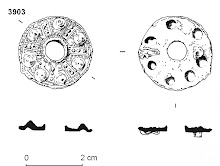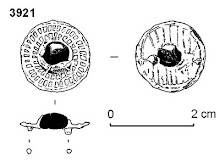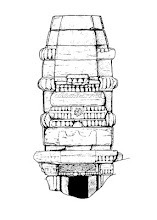Professional archaeology is still a small world where most people will know someone who knows you, but the days of getting jobs down the pub and by word of mouth are (mostly) gone. This article gives some advice for the those looking for site work. It is primarily intended for those at the start of their career but the advice is just the same for old lags struggling to cope with the baffling world of email applications and HR forms.
For most archaeologists getting a new job will involve sending off a CV and/or filling out an application form. In the absence of any formal interviews for most digging jobs this can be your only chance to sell yourself. It really is worth spending time preparing a solid but basic all-purpose CV and then adapting it for each job as required. It may sound like a lot of work and the last thing you fancy after a hard daygrafting in the rain but it really can make the difference between success and the dole.
Traditionally-formatted CVs look great and they work well for traditional industries, but for archaeological jobs the emphasis needs to be slightly different. In today's tough economic times there may be several hundred respondents to each advert, and the CVs all have to pass through the hands of someone who has a quota to fill and not a lot of time to fill it. They have to make a quick decision about each CV and get that pile down to the few who will get a reread and hopefully a phone call. In reality you may have as little as 30 seconds to make sure your CV stays on the table and doesn't go straight into the bin -which is where the vast majority will go. So how do you make your CV escape the 'Reject' pile, and get into that pile of 'Possibles' which will get a more in-depth read?
Firstly, read the job advert. And then read it again. Make notes: what do they say they want in terms of experience? If you don't clearly state that you have the required skills then there is clearly no reason why you deserve to escape the reject pile! Make sure your CV and covering letter cover the relevant points clearly.
Secondly, is there an application form and job description? If there is then it is essential to read it properly and follow the instructions. If you can't be bothered to fill out a form properly by rewriting your experience into the format they want, rather than the way you did it last time, then the employer will naturally think that you don't really want the job and can't follow instructions. Always write everything out in rough first and get someone to proof read it, preferably a non-archaeologist.
Similarly if there is a job description then use that to adapt your CV and covering letter. It sounds crazy but you really do need to show that you are 'an excellent team player' and have 'fantastic communication skills' if that is what they want -but do back it up with evidence from your career. This is particularly important when applications are dealt with by HR departments who aren’t archaeologists and won't be able to read between the lines. As a template consider using the IFA statement of competence and their skills matrix (see http://www.archaeologists.net/join/individual) to outline experience and highlight any particular skills you developed on each site.
Phone up: ask to speak to the person named on the advert, or to HR/whoever deals with recruiting. If you know someone in the unit who respects you, use that contact! Name dropping may result in a discrete (or indiscrete) check and a thumbs up from an existing employee should get your CV a proper airing. If you don't know anyone then still phone, ask intelligent questions, be prepared for searching questions in return, and sound interested and friendly.
Get your application in early, preferably the day the advert goes up, but at least phone up to have a chat and get your name known. With most employers now accepting email applications (because they want to fill those posts quickly) there's no excuse for not quickly adapting your CV and getting it off ASAP. Employers advertise because they need more staff; whilst some units may wait for the closing date and review all applicants thoroughly, for many other units it is a case of needing the staff to start yesterday and the first few people who get in contact and have a half-decent CV will snap up the jobs. Jobs can be filled within a few hours of going up on BAJR.
Be prepared for an immediate start. This sometimes means jumping ship before the end of that huge road scheme you are on to avoid being lost in the flood of recently unemployed colleagues.
So what needs to go on your CV? And how long should it be? Well the standard view is two sides of A4, with the 'good stuff' on the first page. It's not a lot of room so think what you need to prioritise. You are more likely to get a job due to a valid CSCS card, full clean driving licence and your own car than with a first class degree, so industry tickets should be given pride of place on the CV: state that you have a CSCS/EUSR card, that you have experience driving minibuses/4WD and that you hold a First Aid at Work (FAAW) ticket. Say that you have your own car in your covering letter, it does make a difference: employers want staff who are flexible and can get to the office on time for those early starts. They really don't mind paying for you to do a CSCS test, but they do mind not being able to get you onto that site immediately because you don't have one now. It is always worth trying to get a FAAW ticket through a university club or a voluntary group, and you could consider paying for a CSCS test yourself. If you are a foreign national then clearly state that you have a work permit.
Do list your degree, but don't bother with lists of modules unless it is something relevant to the job, e.g. you majored in Archaeological GIS if the job is as a GIS officer. Listing A levels and GCSEs isn't really relevant to a digging job, although if you are low on experience it is worthwhile, especially if they are good grades. Remember, you are trying to sell yourself as a professional archaeologist, not as a student.
Survey experience is a good selling point, preferably with a Leica GPS or Total Station. See if you can spend a few days on the next site being the chainboy for the surveyor, setting up the machine and getting a basic intro is valuable experience and can be listed on your CV or covering letter (as well as being CPD). But be honest about your level of experience and don't lie. If you have only a slight knowledge/ability then maybe include this in with your covering letter or with your employment breakdown for that site rather than listing it as a specific skill.
The list of previous jobs is a major element of the archaeological CV. Indeed 'time-served' is probably the most common tool for deciding which person to hire. Employers like CVs with plenty of experience working for good units, your task is to show how your experience makes you stand out compared to others who may have been digging longer. Include a short sentence about your current role, although this could go in a covering letter. Repeat employment always looks good, as do long periods of work or being kept on after the end of major projects, so highlight those occasions.
Use the IfA competence statement format and set out clearly what you did on each site, what you learnt and what level of responsibility you held. Be honest as everyone really does know everyone and lying on your CV will lose you that job (plus it's against the IfA code of conduct!) You want to get across your breadth of experience, your hard-working ethics, your ability to learn quickly and your mastery of relevant skills -all in one or two lines.
University clubs, and summer jobs in Tescos are not always relevant to digging so only put them in if you have had long gaps in employment, or have little experience. Listing hobbies can be a double-edged sword: if you say you love travel, then the employer may instantly fear you flitting off every two months to Thailand! Consider the relevance of all the information before you put it down.
Think about who you use as a referee for each job and try and try and have a few to choose from. The word of your Project Officer at your old unit will generally be trusted more than a world class academic if you are after a digging job, and vice versa. Finally, warn your referee that you are actively job hunting.
Covering letters/emails give you the opportunity to summarise your CV in a few sentences. Don’t repeat what is on the CV but tailor the text to the specific job that you are applying for. Show how your experience fits with the skill set that they want, and add in any additional relevant skills that aren’t highlighted in your CV.
This is also the place to list all those things that don't fit on a CV, like that you are available for an immediate start and have your own car. Keep it brief but succinct.
Make sure you use a sober-sounding email address, after all, would you employ funkydribbler123@hotmail.com?
Fundamentally you do need a little luck and to be in the right place at the right time, but try and load the dice in your favour. One final piece of advice: ALWAYS run a spell check, and please, please, don't misspell archaeology!
Basic information for an Archaeological Curriculum Vitae
Name with post-nominals including BA etc and IfA grade if applicable.
Date of Birth optional
Address and CURRENT contact details check this is up to date
Education (Degree if applicable, don't list your GCSEs and A levels if you have a degree)
Certificates held including driving licence, CSCS, manual handling, risk assessment etc
IT training/Survey Demonstrable experience and level of competence
Current position
Experience in reverse order and with length of time if short contracts
Publications (including brief outline of grey literature: list types of grey literature eg Method Statements/DBAs/EIA chapters/Evaluation reports)
Referees with their current contact details, preferably including a mobile number.
Starting out
For new graduates or starters in archaeology a major problem with archaeological CVs is the emphasis on time served in commercial archaeology: it's a Catch 22, especially for those trying to break into the jobs market for the first time who can't get commercial experience without having…commercial experience. One way around this is to get far more voluntary experience than is required for your degree. It is hard to survive on a student loan and many students have to work almost full time, but putting in the time on site now will pay dividends later. Plus you find out if you really like the job.Try and use those long summer (and Easter) holidays to get some varied experience and build up your basic digging skillset. There are some excellent training and research excavations around the UK: choose one with a good reputation and that preferably employs professional archaeologists as supervisors -you will then be getting trained by people who know the reality of archaeological work and you will make good contacts for later.
Whilst it is best to build up a solid basis of British fieldwork if you intend to work in the UK in the future, combining foreign digs with a bit of travelling is a great way of meeting people and seeing the world. You could consider spending a couple of seasons on the same project: as a returnee you may get offered in-depth training in a particular skill like planning, environmental processing or context recording, but do try and get a varied spread of experience with different projects. Use the opportunity to learn about fieldwork, and where your interests and strengths lie, whilst not forgetting to enjoy yourself.
In addition to formal fieldwork you could join your local archaeology society and help in occasional fieldwork like fieldwalking or standing building recording, or volunteer at a local museum or unit washing finds. You can do much of this in term-time as well as in the holidays and will get an insight into the range of archaeological organisations out there, as well as making good friends and useful contacts.
Whilst you may not have accrued any actual commercial experience by the end of your degree, you will look a lot more attractive to an employer if you graduate with 6 months varied experience, rather than the minimum 6 weeks or so. It shows commitment to your future career and units will appreciate that and you may get lucky. Units will often take a chance on the occasional keen but green graduate as they feel they can pay them a lower wage as they do not have the experience yet, just make sure that there is proper training and that your pay goes up when you reach proficiency! Some more enlightened units have formal trainee schemes and they will definitely be looking for applicants showing a serious level of commitment.
Times are especially tough for those trying to get started, but all that struggle should be the perfect training for trying to survive once you have finally become a digger!
Useful web-pages and links
There is plenty of information available online: the IfA website also has some excellent resources such as the list of Registered Organisations (http://www.archaeologists.net/ROsearch). Look at the BAJR (http://www.bajr.org/BAJREducation/default.asp), the CBA (http://www.britarch.ac.uk/) and Current Archaeology (http://www.archaeology.co.uk/) websites for a host of useful information on everything from courses, excavations and field schools to local societies. Archaeology Abroad runs a subscription service for digging opportunities overseas (http://www.britarch.ac.uk/archabroad/). All the websites have links to a wide variety of archaeological organisations.













